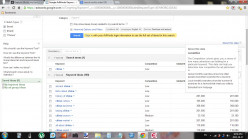Oh oh, my topic mostly consists of Medium to High Ranking keywords
I was deciding on revamping my Oil Shale hub. When looking through the Google Keywords Tool, I had found that A LOT of the keywords I would LIKE to use are mostly Medium to High Completion.
Usual because the generic term "oil companies" ranks LOW, with 1.2 million in searches a month.
There is a trickle of LOW competition keywords. That being said, since the rule of thumb is to mostly use just LOW competition key words, if I decide to use the Medium to High...I should not expect much of a ranking?
Didn't think Oil Shale would be so high in competition.I am not the greatest on this stuff, but doesn't "high competition" mean that many advertisers are competing to put their ads on pages with these keywords? (Not "high competition" as in everyone is writing articles with those keywords.)
High competition means people are paying more for ads on those keywords. It's nothing to do with competition.
The rule of thumb typically when it comes to getting noticed through Google searches, that if you only limit yourself to "low" competition key words, with considerably high number of searches per month.
Around the thousands or 10+ that's a good way to go.
But if you're coming across keywords that are HIGH competition, expect never to get up there in rankings.
Go LOW competition, but HIGH search inquiries.You've got it all wrong.... It's adwords remember - for ads! Use it for volume of searches not competition.
This is what I thought -- that the Google Adwords Keyword tool was designed to be useful to advertisers. Writers have simply figured out a way to get data from it for our own use.
In our business (writing hubs) "high competition" would refer more to how many articles are out there using the keywords you wish to use. That's your competition, not how many people are searching for those keywords. They are the ones you will be competing with to get the searchers attention.
While the competition between advertisers for ad space will affect you by raising what you are paid when a reader clicks, it is not your competition.
To look at your own competition, do a search for the keywords. Google will list how many articles use those keywords at the top of the search result screen. If you're competing with 10 million other articles, and if those articles on page one of the search result are all authority sites then you will probably never rank well. Just too many other articles to beat out to get onto that first page.
The number of searches per month is your potential audience, not your competition. If there are 50 searches per month and you are ranked in first position (maybe because there is no competition for those keywords?) you may see some traffic, but not much. There are, after all, only 50 people looking for your keywords and if all 50 read your hub (unlikely in the extreme) that's still only 50 visits per month.
The trick is to find a balance; reasonable low competition (other articles using the same keywords) with a reasonably high number of searches (people looking for those keywords).I don't have it wrong, I've done my research. A lot of SEO experts will tell you to mainly low competition key words, (with considerable amount of hits), for key words. You could mix it up with high competition keywords, but with low competition....let's say a 10,000 people do searches on a low competition word for the past month....chances are you'll appear higher ranked to that person
Good point, Wilderness... I avoid search amounts in the double digits, that's TOO low, I try for thousands or perhaps 10K +.
The AP program suggests using both "exact" and "broad" in the keyword tool, looking for searches between 500 and 5,000.
To me, an "exact" result of 500 is a little low, but acceptable. That's a decent amount of traffic to fight over, plus there will be other searchers using related terms that will end up on the hub.
A "broad" result of 5,000 is also acceptable; the competition always goes way up, but 5,000 searchers per month is definitely worth your trouble and even a page two result will see some traffic.I think this bit of information has been what has helped me be more effective as an online writer. Thanks for sharing it wilderness.
You're welcome. It's not a simple thing and, for me at least, a lot of "gut feeling" goes into choosing keywords. The tool is just the beginning, not the total picture.
There is another aspect as well that hasn't been touched on here, and that's the question of what google thinks the keywords refer to. I had occasion just this morning to look at the tool in regards to "checking a level" or "testing a level". To me that means checking a carpenters level to be sure it is reading correctly, but a search for those terms turns up sites dealing with blood sugar, cholesterol and other medical "levels". THAT'S what google thinks it means and searchers for that kind of information aren't interested in learning how to check if a carpenters level is accurate.
That keyword thus becomes useless to me; in fact it is detrimental as google will take note of the fact that everyone it sends will quickly back out of my hub, decreasing the time on page numbers. Not a good thing.
What YOU think a keyword refers to is immaterial; what GOOGLE thinks it means counts for everything. Searchers sent to the wrong site will try another keyword, but you can't change your title every ten seconds. It has to tell google what the hub is about in terms that google will understand or you will get nothing but visitors looking for something you aren't even trying to offer.
The HubPages Learning Center article on using the Google Keyword Tool does not even mention checking the "competition" column. Instead, it says, the things for us (as Hub authors) to check are the number of Global Monthly Searches and the Approximate CPC.
http://hubpages.com/learningcenter/google-keyword-tool
My understanding is the same as lobobrandon's and SmartAndFun's.I had naturally assumed the same as you until I read this thread.
However... go to the keyword tool and put in any word.
When the results come up look at the far right hand of the screen.
Click on the link that say "About this data"
A box pops up with a couple of options. The top one is Competition.
Click on Competition and it gives an explination of the column.
This states. "The Competition column gives you a sense of how many advertisers are bidding for a particular keyword."
So, this says to me that the competition in the keyword tool is not OUR competition. This is why you would need to search the term in google in order to find the number of results that come up. Those results are your competition.
I'm really glad you posted this because I had it backwards as well.OH okay, so that Adwords site is based on the perception of the person (the business that wants more traffic to THEIR site), for buying of their "Widgets", not to get traffic to "article sites - which is our articles here"
So THEY go to Google, and say, "My traffic stinks, I just want to somehow create a way to get traffic to my site that sells widgets"
I get it now.No, not really. Their traffic doesn't have to stink at all. As advertisers, it is their job to create awareness of the product (widgets, or whatever else it is). They have to decide the best place to focus their advertising dollars (or yen or euros).
I have never used the Google tool to check for keywords. When I started here, a Hubber named Misha had a hub that recommended using the Google search page itself, the hub used "google keyword tool" in its title. I cannot find the hub itself, perhaps Misha has moved it, I just found a link and it appears to be unpublished. If anyone knows where Misha has republished the article, please post a link. That hub was the best advice I ever received concerning keywords.
It recommended searching for words that are to be used in a hub, the drop down menu in the Google search box offers many variations of the word and recommends phrases. This has proven to be immensely helpful to me.I agree. I use this method too. I keep playing around with the words till I find a search result number I think would be good and definitely not with the triple zeroe's


Related Discussions
- 37
Selecting Precise High Paying Keywords For Traffic And Clicks
by aoiffe379 13 years ago
I have a topic that I researched in Google keyword tool.There were thre columns- Competition,Global Search and Local Search. WhatI realize from reading other hubbers is that traffic and clicks depend on 'evergreen' topics,knowledge, interest,luck,precise keywords for search engines,satisfying needs...
- 25
How to find high-paying keywords through Google's Keyword Tool?
by Isaac Asante 9 years ago
Hi guys,For a while I've been using Google's Keyword Tool to research high-paying keywords and their estimate monthly traffic. Normally, what I do is that I look for Low competition keywords with around 1,000 monthly searches, and less than a million results in Google Search, then I look at the...
- 34
Competition column in Google keyword tool
by Haunty 12 years ago
Can someone explain to me in plain English what competition means with regard to us?It says there that it gives an indication of how many advertisers are bidding for a keyword. But what does that mean?I always thought high competition meant that too many webpages are after the same keyword, but now...
- 29
Getting absolutely no traffic right now
by Majida Liaqat 10 years ago
I joined hubpages one month ago and started writing hubs on weekends because I am very busy on working days. I have published 12-13 hubs right now and they are featured (12 of them while the 13th is still under review). Though my score on each hub is above 50 but I am seeing no traffic coming on my...
- 36
I need some keyword advice.
by Susan W 10 years ago
Hi all. I just started this thread because I need some advice on choosing keywords. Sometimes when selecting keywords, I choose the keywords with about 200 global searches a month but not much competition. This is good and I rank very well for those keywords but I feel that I don't get enough...
- 25
Got in top Goodle Top 20 SERP within 4 hours, will it drop?
by HubTweet 13 years ago
Hi, I created a hubpage 4 hours ago and it's now #18 (second page) out of 24,000+ on the results pages of Google. This is for a one-word keyword.My question is, did I make it to the Top 20 just because the page is new, and will this ranking slide in next few days or week?I won't do backlink...














